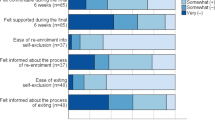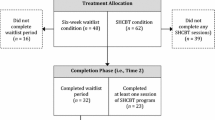Abstract
Research has not determined whether typical improvements in psychosocial functioning following self-exclusion are due to the intervention. This study aimed to explore distinctive outcomes from self-exclusion by assessing outcomes between 1) self-excluders who had and had not received gambling counselling and 2) self-excluders compared to non-self-excluders who had received gambling counselling. A longitudinal design administered three assessments on gambling behaviour, problem gambling severity, gambling urge, alcoholism, general health, and harmful consequences. Of the 86 participants at Time 1 with similar baseline scores, 59.3 % completed all assessments. By Time 2, all groups (self-excluded only, self-excluded plus counselling, counselling only) had vastly improved on most outcome measures. Improvements were sustained at Time 3. Outcomes did not differ for self-exclusion combined with counselling. Compared to non-excluders, more self-excluders abstained from most problematic gambling form and fewer had harmful consequences. Findings suggest self-exclusion may have similar short-term outcomes to counselling alone and may reduce harm in the short-term.
Similar content being viewed by others
References
Australasian Gaming Council. (2014). A database on Australia’s gambling industry 2013/14. Melbourne: Australasian Gaming Council.
Battersby, M., Pols, R., Oakes, J., Smith, D., McLaughlin, K., & Baigent, M. (2010). Definition and predictors of relapse in problem gambling. Melbourne: Gambling Research Australia.
Bellringer, M., Coombes, R., Pulford, J., & Abbott, M. (2010). Formative investigation into the effectiveness of gambling venue exclusion processes in New Zealand. Wellington: Ministry of Health.
Blaszczynski, A., Ladouceur, R., & Shaffer, H. (2004). A science-based framework for responsible gambling: the Reno Model. Journal of Gambling Studies, 20, 301–317.
Blaszczynski, A., Ladouceur, R., & Nower, L. (2007). Self-exclusion: a proposed gateway to the treatment model. International Gambling Studies, 7(1), 59–71.
Cohen, I. M., McCormick, A. V., & Corrado, R. R. (2011). BCLC’s voluntary self-exclusion program: Perceptions and experiences of a sample of program participants. Vancouver: BC Centre for Social Responsibility.
Croucher, J. S., Croucher, R. F., & Leslie, J. R. (2006). Report of the pilot study on the self-exclusion program conducted by GameChange (NSW). Sydney: GameChange.
Ewing, J. A. (1984). Detecting alcoholism. JAMA, the Journal of the American Medical Association, 252(14), 1905–1907.
Ferris, J., & Wynne, H. (2001). The Canadian problem gambling index: Final report. Ottawa: Canadian Centre on Substance Abuse.
Gainsbury, S. (2010). Self-exclusion: A comprehensive review of the evidence. Guelph: Ontario Problem Gambling Research Centre.
Goldberg, D., & Williams, P. (1988). A users guide to the General Health Questionnaire. Slough: NFER- Nelson.
Grant Kalischuk, R. G. (2010). Co-creating life pathways: problem gambling and its impact on families. The Family Journal, 18(1), 7–17.
Hayer, T., & Meyer, G. (2011a). Self-exclusion as a harm minimization strategy: evidence for the casino sector from selected European countries. Journal of Gambling Studies, 27, 685–700.
Hayer, T., & Meyer, G. (2011b). Internet self-exclusion: characteristics of self-excluded gamblers and preliminary evidence for its effectiveness. International Journal of Mental Health and Addiction, 9(3), 296–307.
Hing, N., & Nuske, E. (2009). Assisting problem gamblers in the gaming venue: An assessment of responses provided by frontline staff, customer liaison officers and gambling support services to problem gamblers in the venue. Brisbane: Queensland Office of Gaming Regulation.
Hing, N., & Nuske, E. (2012). The self-exclusion experience for problem gamblers in South Australia. Australian Social Work, 64(4), 457–473.
Hodgins, D. C., & el-Guebaly, N. (2004). Retrospective and prospective reports of precipitants to relapse in pathological gambling. Journal of Consulting and Clinical Psychology, 72(1), 72–80.
Holdsworth, L., Nuske, E., Tiyce, M., & Hing, N. (2013). Impacts of gambling problems on partners: Partners’ interpretations. Asian Journal of Gambling Issues and Public Health, 3(11). doi:10.1186/2195-3007-3-11.
Ladouceur, R., Jacques, C., Giroux, I., Ferland, F., & Leblond, J. (2000). Brief communications: analysis of a casino’s self-exclusion program. Journal of Gambling Studies, 16(4), 453–460.
Ladouceur, R., Sylvain, C., & Gosselin, P. (2007). Self-exclusion program: a longitudinal evaluation study. Journal of Gambling Studies, 23, 85–94.
Ly, C. (2010). Investigating the use and effectiveness of the Tasmanian Gambling (Self) Exclusion Program. Hobart: Department of Health and Human Services.
Neal, P., Delfabbro, P. H., & O’Neil, M. (2005). Problem gambling and harm: Towards a national definition. Melbourne: Gambling Research Australia.
Nelson, S. E., Kleschinsky, J. H., LaBrie, R. A., Kaplan, S., & Shaffer, H. J. (2010). One decade of self exclusion: Missouri casino self-excluders four to ten years after enrolment. Journal of Gambling Studies, 26, 129–144.
Nowatzki, N., & Williams, R. J. (2002). Casino self-exclusion programmes: a review of the issues. International Gambling Studies, 2, 3–25.
Nower, L., & Blaszczynski, A. (2008). Recovery in pathological gambling: an imprecise concept. Substance Use and Misuse, 43(12–13), 1844–1864.
O’Neil, M., Whetton, S., Dolman, B., Herbert, M., Giannopolous, V., O’Neil, D., & Wordley, J. (2003). Part A—Evaluation of self-exclusion programs in Victoria and Part B—Summary of self-exclusion programs in Australian states and territories. Melbourne: Gambling Research Panel.
Pallesen, S., Mitsem, M., Kvale, G., Johnsen, B. H., & Molde, H. (2005). Outcome of psychological treatments of pathological gambling: a review and meta-analysis. Addiction, 100(10), 1412–1422.
Patford, J. L. (2008). For poorer: how men experience, understand and respond to problematic aspects of a partner’s gambling. Gambling Research, 19(1 & 2), 7–20.
Patford, J. L. (2009). For worse, for poorer and in ill health: how women experience, understand and respond to a partner’s gambling problems. International Journal of Mental Health and Addiction, 7, 177–189.
Productivity Commission. (1999). Australia’s gambling industries. Report No. 10. Canberra: AusInfo.
Productivity Commission. (2010). Gambling, report no. 50. Canberra: Commonwealth of Australia.
Raylu, N., & Oei, T. (2004). The Gambling Urge Scale: development, confirmatory factor validation, and psychometric properties. Psychology of Addictive Behaviors, 18(2), 100–105.
Reith, G. (2006). Research on the social impacts of gambling. Glasgow: Scottish Executive Social Research.
Responsible Gambling Council. (2013). What’s the problem with problem gambling? Toronto: Responsible Gambling Council.
Sibbald, B., & Roland, M. (1998). Understanding controlled trials. Why are randomised controlled trials important? BMJ [British Medical Journal], 316(7126), 201.
Steinberg, M.A. (2008). Ongoing evaluation of a self-exclusion program. Paper presented at the 22nd National Conference on Problem Gambling, Long Beach, California, 26–28 June.
Townshend, P. (2007). Self-exclusion in a public health environment: an effective treatment option in New Zealand. International Journal of Mental Health Addiction, 5, 390–395.
Tremblay, N., Boutin, C., & Ladouceur, R. (2008). Improved self-exclusion program: preliminary results. Journal of Gambling Studies, 24(4), 505–518.
Verlik, K. (2008). Casino and racing entertainment centre voluntary self-exclusion program evaluation. Paper presented at the 7th European Conference on Gambling Studies and Policy Issues, Nova Gorica, Slovenia, July 1–4, 2008. Retrieved 18 August 2011, from: http://www.easg.org/website/conference.cfm?id=14&cid=14§ion=PRESENTATIONS
Williams, R. J., West, B. L., & Simpson, R. I. (2012). Prevention of problem gambling: A comprehensive review of the evidence and identified best practices. Guelph: Ontario Problem Gambling Research Centre.
Acknowledgments
This research was funded by a Responsible Gambling Research Grant from the Queensland Department of Justice and Attorney General. Our appreciation is extended to the participants for their important and valuable involvement.
Conflict of Interest
The first and second authors have received funding support and provided consultancies to organisations directly and indirectly benefiting from gambling, including Australian governments and industry operators.
The third author has received funding support from state governments which was derived from industry sources.
The fourth author has received funding support from state governments which was derived from industry sources.
Informed Consent
All procedures followed were in accordance with the ethical standards of the responsible committee on human experimentation (institutional and national) and with the Helsinki Declaration of 1975, as revised in 2000 (5). Informed consent was obtained from all patients for being included in the study.
Author information
Authors and Affiliations
Corresponding author
Rights and permissions
About this article
Cite this article
Hing, N., Russell, A., Tolchard, B. et al. Are There Distinctive Outcomes from Self-Exclusion? An Exploratory Study Comparing Gamblers Who Have Self-Excluded, Received Counselling, or Both. Int J Ment Health Addiction 13, 481–496 (2015). https://doi.org/10.1007/s11469-015-9554-1
Published:
Issue Date:
DOI: https://doi.org/10.1007/s11469-015-9554-1




